Broccoli is a very versatile vegetable. You can use broccoli in a stir fry, steam it, boil it, bake it with cheese, blend it into soup, and even eat it raw. But unexpected bitterness is unpleasant in any of these scenarios. So if you’ve come across bitter broccoli, you might be wondering what’s caused it. And what can you do to fix it? Read on to find out.
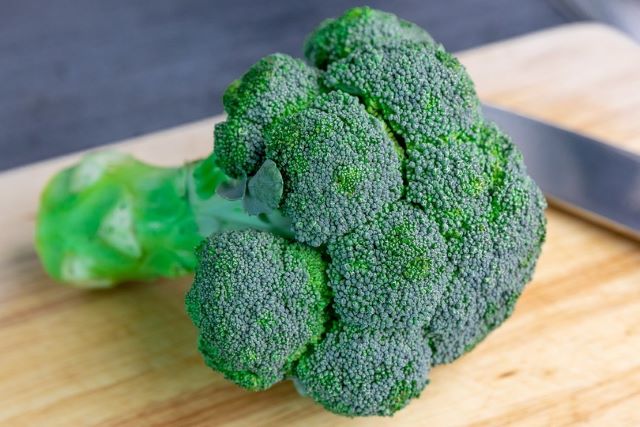
Related: How To Grow Broccoli: Planting, Caring and Harvesting Broccoli
Table of Contents
- Why Is My Broccoli Bitter?
- Why Does Glucosinolate Cause Bitter Broccoli?
- What Stresses Broccoli and Causes Bitterness?
- Why Bolting Causes Bitter Broccoli
- Is Bitter Broccoli Safe to Eat?
- Less Bitter Broccoli Varieties
- Picking the Best Broccoli In Supermarkets
- How To Make Broccoli Less Bitter
- Why Did My Broccoli Go Bitter Only After Cooking It?
Why Is My Broccoli Bitter?
Bitter broccoli is caused by higher levels of a compound called glucosinolates. This is produced when the broccoli plant is stressed and bolts, producing long stems with flowers, or in poor growing conditions. The age of broccoli can also cause it to turn bitter.
Why Does Glucosinolate Cause Bitter Broccoli?
As a cruciferous (meaning part of the cabbage family) vegetable, all broccoli contains sulforaphane, a type of glucosinolate. But the quantities of this bitter substance may vary greatly in the plants, resulting in some that are far more bitter than others.
In nature, the purpose of this compound is to protect the plant. Mostly, this is due to it deterring certain insect species.
The sulforaphane is always present but only becomes bitter when the broccoli plant experiences stress. The plant cells, when they experience any form of damage, release enzymes such as myrosinase, which hydrolyze sulforaphane into something called an isothiocyanate. This is the substance that our taste buds pick up.
Unfortunately, broccoli plants cannot tell the difference between stressors the same way that we can. This means that the bitter taste could be from insect damage, or just damage at the cut site where it’s been harvested.
The more damage that occurs, the more myrosinase is released. And the more time passes after the damage, the more time it has to work, increasing the bitterness of the broccoli.
What Stresses Broccoli and Causes Bitterness?
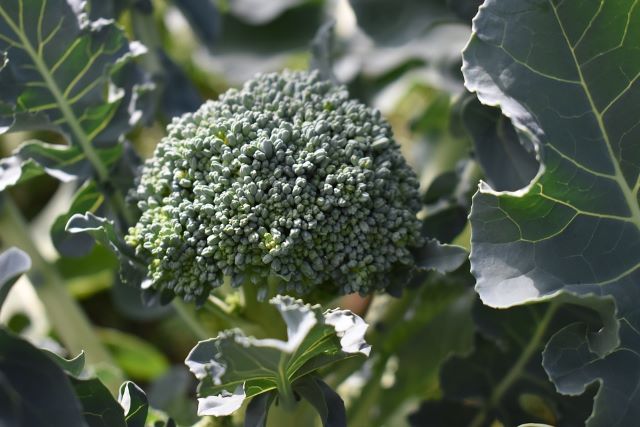
There are many different things that can stress your broccoli plant and cause bitterness. Here are some things you want to consider:
- Heat stress (including burns)
- Insufficient water
- Frost damage
- Pest damage
- Nitrogen imbalance in the soil
- Other nutrient deficiencies
- Overcrowding
- Heavy metals
- Size
- Age
- Seasonal changes
- Overharvesting
Why Bolting Causes Bitter Broccoli
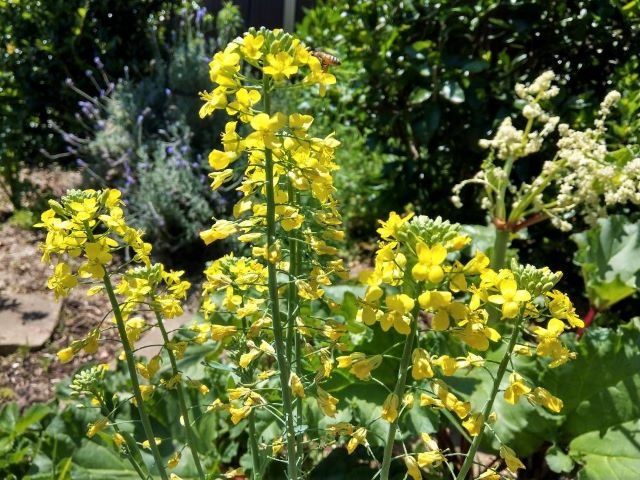
Bolting is the process where the broccoli plant tries to reproduce. It shoots long stems into the air, and produces flowers. Usually, these are yellow. The flowers can then be pollinated and the broccoli seeds produced.
But, why is this process connected to a drastic increase in bitterness?
Broccoli bolts because the growing conditions are not right. There’s a danger that the plant might not survive. This can be due to the changing seasons, leading to a change in ideal conditions.
This means that bolting broccoli plants experience a great deal of stress, leading to the release of myrosinase and the process that I mentioned above.
Related: Why Is My Broccoli Flowering? Causes and Solutions!
Is Bitter Broccoli Safe to Eat?
Yes, even the most bitter broccoli is perfectly safe to eat.
However, if you think that your broccoli is going bad, be on the safe side and avoid it. Bacteria that are found in rotting food may also cause a strange taste. This bacteria is not safe to ingest and may cause a variety of acute illnesses. Instead, I would recommend composting it in your garden or otherwise throwing it away.
Less Bitter Broccoli Varieties
There are definitely some varieties of broccoli that are less likely to be bitter than others. However, it is important to remember that the bitterness of broccoli has a function and that these might be more pest prone. This is generally not a problem, but simply means they may benefit from being covered with netting.
One of the least bitter broccoli varieties is Broccolini, which is a Chinese Broccoli and Broccoli hybrid. Despite the name, Chinese Broccoli resembles kale more than any broccoli you might be familiar with. Another broccoli variety called Green Magic is renowned for its mild flavor and produces the more traditional heads that you may be familiar with.
However, it’s best to choose broccoli based on the conditions you will be growing it in. If you are growing broccoli in colder conditions, Green Magic may not be preferable. Instead, try Arcadia. The more suitable to your specific conditions, the less damage to the plant, and the better the taste.
Here is a useful tip to avoid using pesticides to protect sweeter varieties of broccoli against insect damage, a mixture of about 1:10 dishwashing liquid to water works well against small pests such as aphids. Just make sure your dishwashing liquid doesn’t contain inorganic materials such as chlorine.
Picking the Best Broccoli In Supermarkets
Broccoli meant for supermarkets is usually the best of the best in terms of any potential pest damage. Even in organic growing conditions, other methods are used to ensure there is no pest damage that makes the broccoli look bad.
However, you will have to deal with broccoli that has been cut quite some time ago. For this reason, there will always be a small amount of bitterness, even in the sweetest varieties. To minimize this unwanted taste, try to find the freshest broccoli you can.
As a general rule, the brighter and richer the green color of the broccoli, the better!
Broccoli starts to go yellow or brown around the edges as it ages. If the broccoli is wrapped in plastic but there is a large amount of moisture inside, and the broccoli itself seems to be a bit limp, this may also be an indication of the broccoli’s age. Don’t be afraid to poke and prod at your produce.
Bigger heads are also going to be more sweet as the amount of damage done while harvesting the broccoli is smaller relative to the size of the head.
How To Make Broccoli Less Bitter
It may not always be possible to get sweet broccoli. And, if you have a relatively fresh head that should still be fine to eat otherwise, wasting it would be a shame. So, here are some ways that you can reduce the bitterness of your broccoli.
If Eating Cooked Broccoli
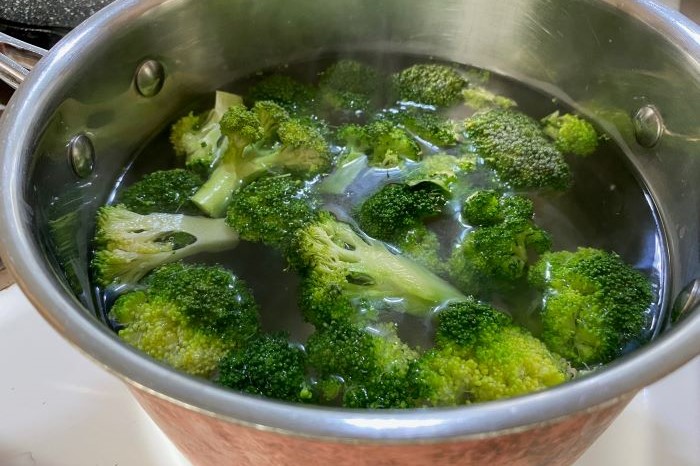
One of the best ways to make broccoli taste less bitter is to boil it in incredibly salty water for two to three minutes, or until the color starts to brighten very slightly.
Once this is done, drain the overly salty water, rinse your broccoli, and then continue cooking it as you would otherwise. Just make sure that you account for the amount of time that it has already been spent cooking in the boiling water.
If this fails, try cooking the broccoli with other vegetables that are naturally sweet when cooked. Some examples include carrots, bell peppers and onions.
If Eating Raw Broccoli
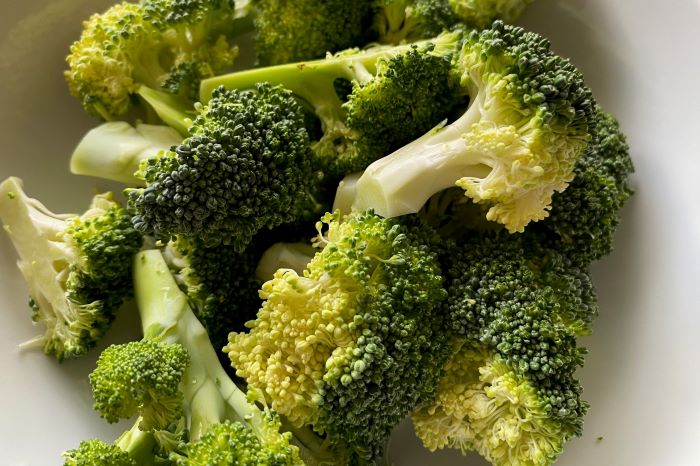
Unfortunately, if you want to eat broccoli raw, the bitter flavor is going to be far more intense. It would be impossible to get raw broccoli as sweet as cooked varieties, but there are still some things that you can do.
Try soaking your broccoli in cold, salty water. The colder you can get it, the better. This not only leaches out some of the bitter taste, but also temporarily prevents the enzymes within it from working. The same thing applies to getting the broccoli in your fridge as soon as possible after it’s harvested.
Just make sure that you eat it soon after and don’t allow it to warm to room temperature again. Otherwise, the bitter flavor will be exacerbated by the cold damage.
If this doesn’t work, try adding something that neutralizes the bitterness. Something sweet like a glaze or creamy like mayonnaise works well.
Why Did My Broccoli Go Bitter Only After Cooking It?
If your broccoli was otherwise fine before you started cooking it, but is now overly bitter, you overdid it. Overcooking broccoli not only causes a bitter flavor, but also leaches a lot of the vitamins and minerals out of it.
Your broccoli stems should still be quite firm and the color vibrant when it is done. If you notice the color is dulling or the stems seem to be absorbing too much water, stop cooking immediately.
Broccoli cooks very quickly so it is very easy to overcook them. I have gotten jelly-like, limp trees on more than one occasion because I got a little bit distracted. In these cases, my favorite fix is to make a batch of bechamel sauce. The rich, milky flavor covers the bitterness well, although it may not necessarily accompany everything perfectly.
Further Reading:
